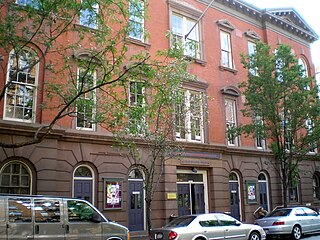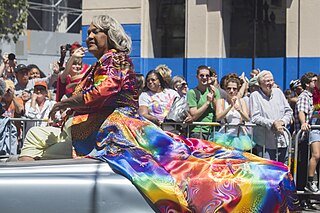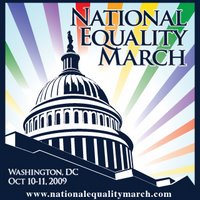
Lesbian, gay, bisexual, and transgender (LGBT) movements are social movements that advocate for LGBT people in society. Although there is not a primary or an overarching central organization that represents all LGBT people and their interests, numerous LGBT rights organizations are active worldwide. The first organization to promote LGBT rights was the Scientific-Humanitarian Committee, founded in 1897 in Berlin.

The LGBT community is a loosely defined grouping of lesbian, gay, bisexual, and transgender individuals united by a common culture and social movements. These communities generally celebrate pride, diversity, individuality, and sexuality. LGBT activists and sociologists see LGBT community-building as a counterweight to heterosexism, homophobia, biphobia, transphobia, sexualism, and conformist pressures that exist in the larger society. The term pride or sometimes gay pride expresses the LGBT community's identity and collective strength; pride parades provide both a prime example of the use and a demonstration of the general meaning of the term. The LGBT community is diverse in political affiliation. Not all people who are lesbian, gay, bisexual, or transgender consider themselves part of the LGBT community.

The homophile movement is a collective term for the main organisations and publications supporting and representing sexual minorities in the 1950s to 1960s around the world. The name comes from the term homophile, which was commonly used by these organisations. At least some of these organisations are considered to have been more cautious than both earlier and later LGBT organisations; in the U.S., the nationwide coalition of homophile groups disbanded after older members clashed with younger members who had become more radical after the Stonewall riots of 1969.
GLSEN is an American education organization working to end discrimination, harassment, and bullying based on sexual orientation, gender identity and gender expression and to prompt LGBT cultural inclusion and awareness in K-12 schools. Founded in 1990 in Boston, Massachusetts, the organization is now headquartered in New York City and has an office of public policy based in Washington, D.C.

LGBT culture is a culture shared by lesbian, gay, bisexual, transgender, and queer individuals. It is sometimes referred to as queer culture, while the term gay culture may be used to mean either "LGBT culture" or homosexual culture specifically.
The origin of the LGBT student movement can be linked to other activist movements from the mid-20th century in the United States. The Civil Rights Movement and Second-wave feminist movement were working towards equal rights for other minority groups in the United States. Though the student movement began a few years before the Stonewall riots, the riots helped to spur the student movement to take more action in the US. Despite this, the overall view of these gay liberation student organizations received minimal attention from contemporary LGBT historians. This oversight stems from the idea that the organizations were founded with haste as a result of the riots. Others historians argue that this group gives too much credit to groups that disagree with some of the basic principles of activist LGBT organizations.

The Lesbian, Gay, Bisexual & Transgender Community Center, commonly called The Center, is a nonprofit organization serving the lesbian, gay, bisexual and transgender (LGBT) population of New York City and nearby communities.

Pride at Work (P@W) is an American lesbian, gay, bisexual and transgender group (LGBTQ+) of labor union activists affiliated with the AFL-CIO.

The Audre Lorde Project is a Brooklyn, New York–based organization for LGBT people of color. The organization concentrates on community organizing and radical nonviolent activism around progressive issues within New York City, especially relating to LGBT communities, AIDS and HIV activism, pro-immigrant activism, prison reform and organizing among youth of color. It is named for the lesbian-feminist poet and activist Audre Lorde and was founded in 1994.

LGBT movements in the United States comprise an interwoven history of lesbian, gay, bisexual, transgender and allied social movements in the United States of America, beginning in the early 20th century. A commonly stated goal among these movements is social equality for LGBT people. Some have also focused on building LGBT communities or worked towards liberation for the broader society from biphobia, homophobia, and transphobia. LGBT movements organized today are made up of a wide range of political activism and cultural activity, including lobbying, street marches, social groups, media, art, and research. Sociologist Mary Bernstein writes: "For the lesbian and gay movement, then, cultural goals include challenging dominant constructions of masculinity and femininity, homophobia, and the primacy of the gendered heterosexual nuclear family (heteronormativity). Political goals include changing laws and policies in order to gain new rights, benefits, and protections from harm." Bernstein emphasizes that activists seek both types of goals in both the civil and political spheres.

The National Equality March was a national political rally that occurred October 11, 2009 in Washington, D.C. It called for equal protection for lesbian, gay, bisexual, and transgender (LGBT) people in all matters governed by civil law in all 50 states and the District of Columbia. The march was called for by activist David Mixner and implemented by Cleve Jones, and organized by Equality Across America and the Courage Campaign. Kip Williams and Robin McGehee served as co-directors. Leaders like actress Michelle Clunie, Courage Campaign marketing director, Billy Pollina and New York gubernatorial aide Peter Yacobellis hosted the first fundraiser in the spring of 2009. This was the first national march in Washington, D.C. for LGBT rights since the 2000 Millennium March.

The Houston GLBT Community Center was a community center for gay, lesbian, bisexual, and transgender people and their allies in the Houston metropolitan area and southeast Texas. Its last location was in the Dow School building in the Sixth Ward of Houston.

The first English-language use of the word "bisexual" to refer to sexual orientation occurred in 1892.

The David Bohnett Foundation is a private foundation that gives grants to organizations that focus on its core giving areas – primarily Los Angeles area programs and LGBT rights in the United States, as well as leadership initiatives and voter education, gun violence prevention, and animal language research. As of 2022, the foundation has donated $125 million to nonprofit organizations and initiatives.

The following outline offers an overview and guide to LGBT topics.
GAPIMNY is an all-volunteer-run organization that provides a range of social, educational, and cultural programming for queer and transgender people who are Asian and/or Pacific Islander in the New York City metropolitan area to support each other. The organization's community building efforts is intricately tied to political education and mutual aid.

LGBT culture in Baltimore, Maryland is an important part of the culture of Baltimore, as well as being a focal point for the wider LGBT community in the Baltimore metropolitan area. Mount Vernon, known as Baltimore's gay village, is the central hub of the city's lesbian, gay, bisexual, and transgender communities.
The National LGBTQ Wall of Honor is a memorial wall in the Greenwich Village neighborhood of Manhattan in New York City, dedicated to LGBTQ "pioneers, trailblazers, and heroes". Located inside the Stonewall Inn, the wall is part of the Stonewall National Monument, the first U.S. National Monument dedicated to the country's LGBTQ rights and history. The first fifty nominees were announced in June 2019, and the wall was unveiled on June 27, 2019, as a part of Stonewall 50 – WorldPride NYC 2019 events. Five honorees will be added annually.











